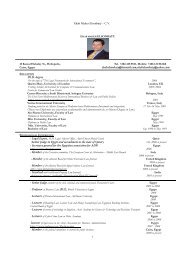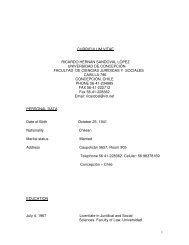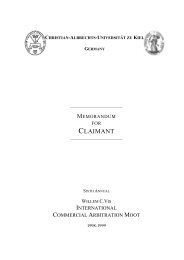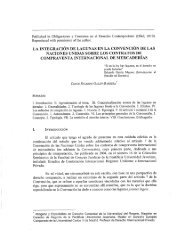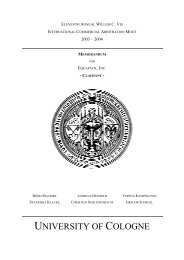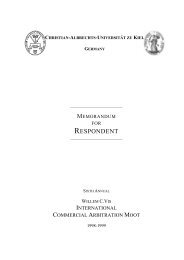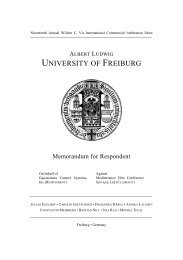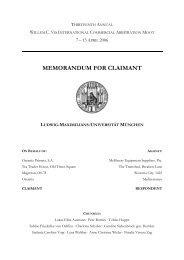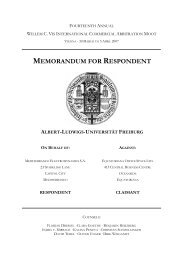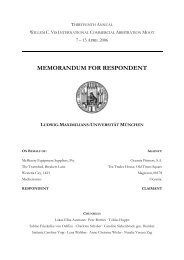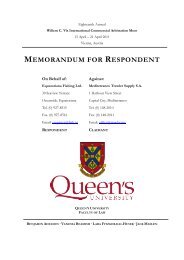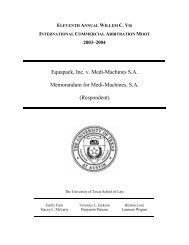CLAIMANT 0800 FINAL 12072006
CLAIMANT 0800 FINAL 12072006
CLAIMANT 0800 FINAL 12072006
Create successful ePaper yourself
Turn your PDF publications into a flip-book with our unique Google optimized e-Paper software.
prompted a reasonable party to investigate by accessing the Equalec website [Clar. Q. 24], consulting<br />
with Equalec, knowledgeable suppliers or industry groups, or, at least, by requesting clarification<br />
from Claimant itself.<br />
51. Respondent was bound to observe Equalec’s connection requirements in so far as they were pre-<br />
requisites for Equalec to lock the Fuse Boards. Equalec’s refusal to connect and lock the Fuse<br />
Boards on 8 Sept. 2005 [Statement of Claim 14] shows that the Fuse Policy was such a pre-requisite,<br />
giving independent grounds for Respondent’s breach.<br />
B. The Fuse Boards were not fit for a particular purpose made known to<br />
Respondent.<br />
52. Even if the Fuse Boards were of the quality and description required by the Contract under Art.<br />
35(1) CISG, they were not fit for the particular purpose of connecting Mountain View Office Park<br />
to Equalec’s electrical grid. Goods do not conform to the original contract under Art 35(2)(b) when<br />
they are not “fit for any particular purpose expressly or impliedly made known to the seller at the<br />
time of the conclusion of the contract.” This means that regardless of the express terms of the<br />
Contract, the goods should fulfill any particular purpose communicated to the seller [Schwenzer in<br />
Schlechtriem05 421; Neumayer 278; Bianca in Bianca/Bonell B 275; Marques (Fr.), cited in Lookofsky 93].<br />
However, Art. 35(2)(b) provides an exception where “the circumstances show that the buyer did not<br />
rely, or that it was unreasonable for him to rely, on the seller’s skill and judgement” [see also Bianca in<br />
Bianca/Bonell 274; Schlechtriem in Galston/Smit 6-20; Lookofsky 92; Henschel §m; Helsinki CA (Fin.)].<br />
Claimant expressly or impliedly made known to Respondent the particular purpose of connecting to<br />
Equalec’s electrical grid (1). Claimant relied on Respondent’s skill and judgment (2) and this reliance<br />
was reasonable (3).<br />
1. Claimant made known the particular purpose of connecting to Equalec’s grid.<br />
53. The particular purpose of the Fuse Boards was for them to connect the Mountain View Office Park<br />
to Equalec’s electrical grid. Under Art. 35(2)(b) CISG, the communication of a particular purpose<br />
may be either “express” or “implied” [see also Schlechtriem 280]. Claimant expressly informed<br />
Respondent of this purpose by 4 May 2005 when it sent the Drawings with the Equalec note,<br />
obliging Respondent to deliver Fuse Boards meeting Equalec requirements (see supra 46). Even if<br />
the specification “lockable to Equalec requirements” was not an express communication of the<br />
particular purpose, Claimant impliedly informed Respondent. Respondent, as an experienced<br />
specialist [Answer 2; Re. Ex. 1], knew that the Fuse Boards had no other purpose than to connect to<br />
20



